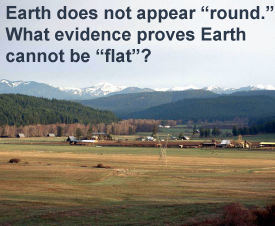|
Scientists use logic to evaluate whether observed evidence agrees or disagrees with testable predictions of a hypothesis. One type of logical argument is the if–then statement. This logic has the form “if ____ is true, then ____ must also be true.” The diagram below shows how observations of the phases of Venus support the explanation that both Earth and Venus orbit the Sun. 
 |
If you have taken a logic class or studied logic in your math class, then you have probably learned about logical statements. Start with the statement, “if (a) then (b).” This statement does not imply that “if not (a) then not (b).” Instead, the initial statement logically implies that “if not (b) then not (a),” which is called the contrapositive statement. An example would be, “If you kill a man, then you will always go to jail.” It does not logically follow that, if you go to jail, then you have killed a man. Instead, the contrapositive is true: If you have not gone to jail, then you have not killed a man. 
|

|
The phases of Venus are an example of how observational testing can be used to evaluate a scientific explanation. The observations of Venus are both objective and repeatable and therefore satisfy the rules for acceptable scientific evidence. 
|
 Multiple types of observational evidence may be needed. For example, the Earth appears generally flat, not round. Research and present evidence for the “flatness” of Earth and also evidence for “roundness.” How does each piece of evidence support each claim? Which evidence shows that Earth cannot be flat? What logical argument would convince a 14th–century person that our planet is actually round?
Multiple types of observational evidence may be needed. For example, the Earth appears generally flat, not round. Research and present evidence for the “flatness” of Earth and also evidence for “roundness.” How does each piece of evidence support each claim? Which evidence shows that Earth cannot be flat? What logical argument would convince a 14th–century person that our planet is actually round? 
|
Scientific explanations provide causes for the effects that we observe. For example, Newton stated that objects at rest start moving because of the action of unbalanced forces. The forces are the cause and the motion is the effect. Think of three “effects” for which you can identify the physical causes. Describe these to your class using the word “because.” For example, “I believe ____ happens because _____.” You may not realize it but your statements are scientific hypotheses! They are tentative explanations of real effects. It may help to record your hypotheses. 
|
Clear communication is crucial in science. Physics uses new vocabulary to ensure that what is said or written has the same meaning to everyone. For example, suppose someone offered to sell you a “strong” rope. What does “strong” mean? You might want to use the rope to tow a car, requiring a strength of 10,000 lb or more. The seller might mean strong enough that you cannot break it with your hands, a strength of 150 lb or so. Replacing the word “strong” with a scientific term—such as the rope having a “working load of 500 pounds”—avoids misunderstandings. The term “working load” has a clearly defined meaning. 
|
|
|

